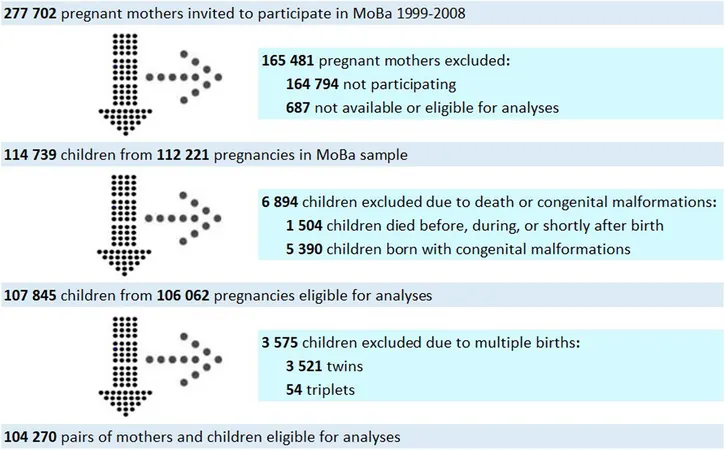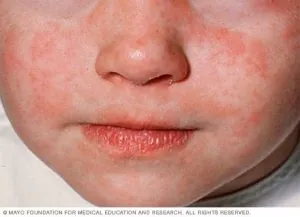
Unlocking the Link Between Maternal Immune Conditions and ADHD Risk in Offspring
2025-07-01
Author: Olivia
Understanding ADHD: A Growing Concern
Attention-Deficit Hyperactivity Disorder (ADHD) is increasingly recognized as a significant childhood psychiatric disorder, affecting around 5.4% of boys and 2.1% of girls in Norway by the age of 12. The origins of ADHD are complex, involving a mix of genetic influences and environmental triggers. This growing body of research highlights prenatal factors such as prematurity, low birth weight, maternal stress, and substance use during pregnancy as critical elements influencing the development of ADHD.
Maternal Health's Role in ADHD Development
Recent findings point to maternal immune-mediated conditions as potential risk factors for ADHD. This includes two main categories: 1. Allergic conditions like asthma and allergies 2. Autoimmune diseases such as rheumatoid arthritis and type 1 diabetes. While both conditions share some biological insights, they differ fundamentally; allergic conditions provoke exaggerated immune responses to external allergens, whereas autoimmune disorders involve the immune system mistakenly attacking the body itself, leading to chronic inflammation.
A Deep Dive into Maternal Immune Conditions
Preliminary studies indicate that both allergic and autoimmune conditions are linked to increased ADHD risk. However, only a handful have compared these associations in the same population. Immune processes active during pregnancy are thought to significantly impact fetal neurodevelopment, with maternal autoantibodies potentially transferring across the placenta and influencing fetal brain growth.
The Norwegian Study: Shedding Light on ADHD Risks
This substantial study utilized data from over 100,000 mother-child pairs in the Norwegian Mother, Father, and Child Cohort (MoBa). By examining associations between maternal immune-mediated conditions and ADHD in children, the research sought to clarify how these maternal health issues might elevate ADHD risks compared to paternal conditions.
Key Findings on ADHD and Maternal Immune Conditions
The results are striking, revealing a significant correlation between maternal asthma and a 47% increased risk of ADHD in children. Allergies increased risk by 20%, while autoimmune conditions raised it by a substantial 64%. Type 1 diabetes in mothers was particularly alarming, correlating with a staggering 150% increased risk of ADHD in their offspring. It’s crucial to note that the effects of maternal immune conditions were consistently greater than those observed in fathers.
Unraveling the Mechanisms Behind the Risk
How do maternal immune conditions affect fetal brain development? One theory centers on the placenta's role, considered the first functional organ of the fetus. Research into "fetal programming" suggests that maternal immune responses could disrupt normal brain development processes, potentially leading to neurodevelopmental challenges like ADHD and autism. Moreover, links between dopamine pathways and immune functions further demonstrate how maternal health can shape ADHD outcomes.
Navigating the Complexity Ahead
The implications of these findings are profound, indicating a need for heightened awareness and potential interventions for expecting mothers dealing with immune-mediated conditions. Understanding the intricate relationship between maternal health, immune responses, and developmental outcomes can pave the way for strategies aimed at reducing ADHD risks.
Conclusion: A Call for Awareness and Action
In conclusion, maternal immune conditions play a significant role in the risk of ADHD in children, underscoring the importance of maternal health during pregnancy. This research not only deepens our understanding of ADHD but also highlights actionable insights for healthcare providers, families, and policymakers aimed at fostering healthier pregnancies and better developmental outcomes for future generations.









 Brasil (PT)
Brasil (PT)
 Canada (EN)
Canada (EN)
 Chile (ES)
Chile (ES)
 Česko (CS)
Česko (CS)
 대한민국 (KO)
대한민국 (KO)
 España (ES)
España (ES)
 France (FR)
France (FR)
 Hong Kong (EN)
Hong Kong (EN)
 Italia (IT)
Italia (IT)
 日本 (JA)
日本 (JA)
 Magyarország (HU)
Magyarország (HU)
 Norge (NO)
Norge (NO)
 Polska (PL)
Polska (PL)
 Schweiz (DE)
Schweiz (DE)
 Singapore (EN)
Singapore (EN)
 Sverige (SV)
Sverige (SV)
 Suomi (FI)
Suomi (FI)
 Türkiye (TR)
Türkiye (TR)
 الإمارات العربية المتحدة (AR)
الإمارات العربية المتحدة (AR)